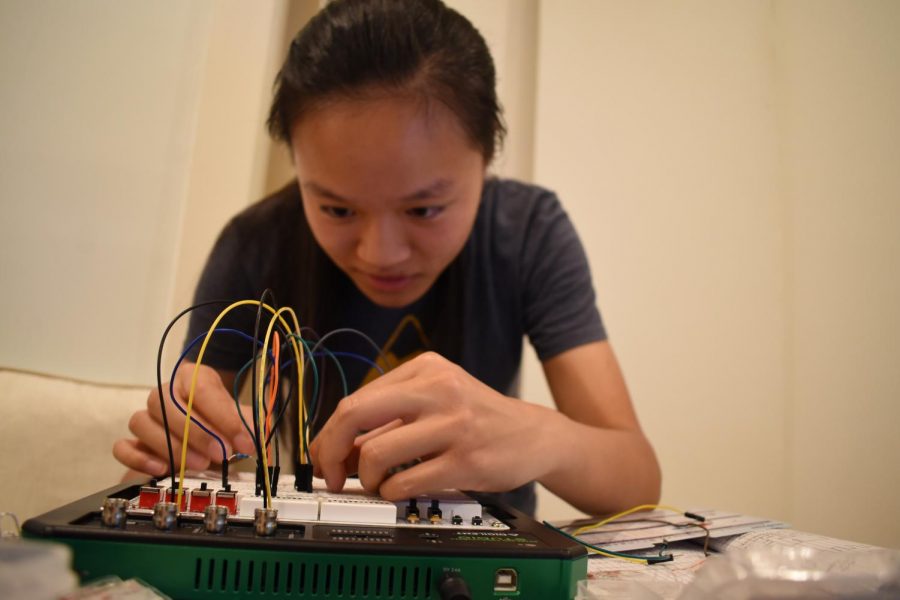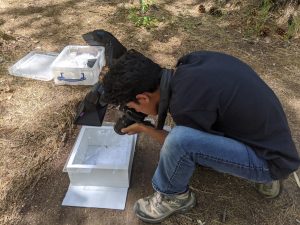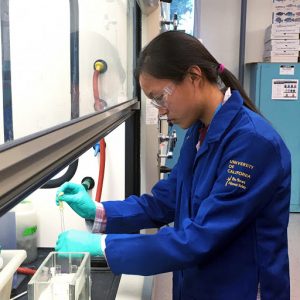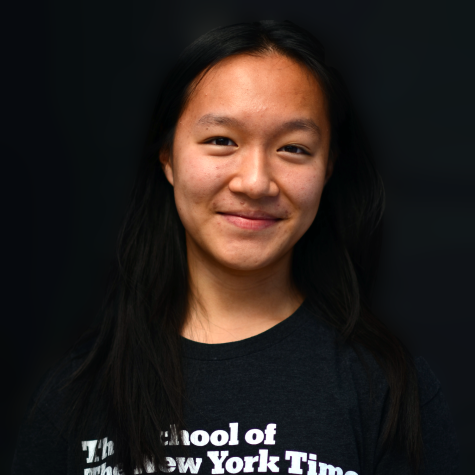Science research continues over summer despite ongoing COVID-19 restrictions
Teresa Cai (12) tinkers with circuits as part of her work in the Research in Science and Engineering (RISE) program at Boston University. Interns collaborated virtually with their mentors and presented their research at the end of the 6-week-long program.
August 19, 2021
Upper school students conducted science research over the summer virtually despite continued restrictions from accessing labs or attending summer programs in person due to the COVID-19 pandemic. Students mainly performed independent research projects or participated in virtual internships or research programs.
Opportunities to conduct research during the school year, either at Harker’s program or elsewhere, come with several benefits, but doing a research project over the summer can have a different set of advantages, explains upper school science research teacher Chris Spenner. There are more opportunities to allocate large blocks of time to pursue a more ambitious project, and if students participate in a summer internship, they can have access to an expert in the field who can guide them to make greater progress.
Due to the lack of access to lab equipment this summer as a result of COVID-19 restrictions, Spenner noticed more students pursuing computer science-based projects, which can be conducted at home. Though Spenner believes the change has actually opened up opportunities and more labs are taking on students to work on data analysis and informatics projects, students are not receiving as much hands-on experience.
“In silico work is valid, but at some point I would recommend that all students get into a wet lab and find out what the techniques are and understand the limits and challenges of the data they are working with,” Spenner said.
Another benefit of the virtual format of most research projects is that online communications systems can facilitate easy and regular correspondence. However, these systems also have their drawbacks. Spenner explained that it can be harder for students to share their work at virtual conferences, where turnout is lower and attendees may not be as deeply invested in students’ research.
In spite of these challenges, many students have successfully found research opportunities this summer to further their knowledge and share their work. Research Club president Alice Feng (12) conducted an informatics project modeling the relationship between RNA and proteins as part of a virtual internship. Still, Alice found that the online format provided less opportunities for deeper interactions.
“I miss being able to see my mentors and other people at the lab in person,” Alice said. “I was able to work in an actual lab setting before [the pandemic], and it was definitely a really great experience just to be able to see everyone in person and have those deeper conversations. That might be a little awkward or just not possible in the virtual setting.”
Although Alice knew the professor she worked with this past summer from a previous project, she noted that reaching out to find internships over the summer can appear daunting for those who are not already familiar with the members of the lab they would potentially be working with. Alice recommended reaching out to many labs in order to maximize the chances of successfully finding an internship.
“It’s good to not be too easily disappointed [when rejected since] there are a lot of different reasons [why internship requests may be turned down] that are not necessarily personal,” Alice said. “Also, before sending out emails, students should definitely look really deep into what the professor’s work is to get a general idea of what areas the professor’s interested in and to demonstrate you have the commitment and interest.”
Alice plans to apply the informatics data she has collected to the biological side of her project.
“By the time that I present this project, the work that I’m going to do during the school year is going to look at how to relate that mathematical equation from the computer science work to the biological connection between RNA and proteins,” Alice said.
Jonny Xue (9) conducted a machine learning research project over the past summer, building a machine learning model to detect emotion given facial images by analyzing facial features and proportional distances at a five-week virtual summer program called Inspirit AI. Mentors from Stanford and MIT guided students along the way.
“Surprisingly, COVID didn’t really impact the amount of research I did,” Jonny said. “It did make other parts of [the process] more complicated, like interacting with others and communicating virtually.”
Despite the virtual format of the program, Jonny’s mentors still worked to engage Jonny and other participants through checkups and office hour sessions. His research project inspired him to look further into the ethics of using artificial intelligence in a medical setting, especially regarding when and how to use machine learning models.
“You can’t implement a model that doesn’t have very good accuracy, especially for healthcare, which needs really high accuracy, considering that’s a matter of life and death. And in the case that the model is wrong, who’s responsible?” Jonny said. “However, if you want to make them more accurate, it gets harder to see how the AI is getting those results. You basically just tweak parameters and see how the AI responds. So accuracy comes at the price of explainability.”
Melody Yazdi (12) also conducted a computer science project, though her project focused on its applications in cell biology. Her project focused on using RNA data to analyze the development of skeletal muscle. Melody conducted her research in association with the California State Summer School for Mathematics & Science (COSMOS), a summer research program.
During the research process, the professors that Melody worked with helped her focus on hands-on research and breaking the research process into steps, ensuring a more easily navigable and rewarding project. Her experience cemented her interest in biology as a possible path in the future.
“I think I’ve always known that biology was something that interested me, more specifically genetics and genomics, so I really valued this program because the professors taught us everything there was to know about what is going on in the field currently,” Melody said. “That allowed me to make a sure decision that biology was something I wanted to pursue for the future.”
As students consider their research options for the future, Spenner recommended keeping a mind open to new opportunities, whether it is in science research or another pursuit. As students begin to explore their interests and passions, future opportunities at college and beyond promise to open many more doors and create interdisciplinary connections.
“Be patient if you had a rough experience. You don’t have to give up on it just because the science approach that was available to you during the pandemic didn’t work out,” Spenner said. “If it’s a question that you care about, something that you want to find out about, something you’re curious about exploring, stick with it; don’t give it up.”


















![“[Building nerf blasters] became this outlet of creativity for me that hasn't been matched by anything else. The process [of] making a build complete to your desire is such a painstakingly difficult process, but I've had to learn from [the skills needed from] soldering to proper painting. There's so many different options for everything, if you think about it, it exists. The best part is [that] if it doesn't exist, you can build it yourself," Ishaan Parate said.](https://harkeraquila.com/wp-content/uploads/2022/08/DSC_8149-900x604.jpg)




![“When I came into high school, I was ready to be a follower. But DECA was a game changer for me. It helped me overcome my fear of public speaking, and it's played such a major role in who I've become today. To be able to successfully lead a chapter of 150 students, an officer team and be one of the upperclassmen I once really admired is something I'm [really] proud of,” Anvitha Tummala ('21) said.](https://harkeraquila.com/wp-content/uploads/2021/07/Screen-Shot-2021-07-25-at-9.50.05-AM-900x594.png)







![“I think getting up in the morning and having a sense of purpose [is exciting]. I think without a certain amount of drive, life is kind of obsolete and mundane, and I think having that every single day is what makes each day unique and kind of makes life exciting,” Neymika Jain (12) said.](https://harkeraquila.com/wp-content/uploads/2017/06/Screen-Shot-2017-06-03-at-4.54.16-PM.png)








![“My slogan is ‘slow feet, don’t eat, and I’m hungry.’ You need to run fast to get where you are–you aren't going to get those championships if you aren't fast,” Angel Cervantes (12) said. “I want to do well in school on my tests and in track and win championships for my team. I live by that, [and] I can do that anywhere: in the classroom or on the field.”](https://harkeraquila.com/wp-content/uploads/2018/06/DSC5146-900x601.jpg)
![“[Volleyball has] taught me how to fall correctly, and another thing it taught is that you don’t have to be the best at something to be good at it. If you just hit the ball in a smart way, then it still scores points and you’re good at it. You could be a background player and still make a much bigger impact on the team than you would think,” Anya Gert (’20) said.](https://harkeraquila.com/wp-content/uploads/2020/06/AnnaGert_JinTuan_HoHPhotoEdited-600x900.jpeg)

![“I'm not nearly there yet, but [my confidence has] definitely been getting better since I was pretty shy and timid coming into Harker my freshman year. I know that there's a lot of people that are really confident in what they do, and I really admire them. Everyone's so driven and that has really pushed me to kind of try to find my own place in high school and be more confident,” Alyssa Huang (’20) said.](https://harkeraquila.com/wp-content/uploads/2020/06/AlyssaHuang_EmilyChen_HoHPhoto-900x749.jpeg)















